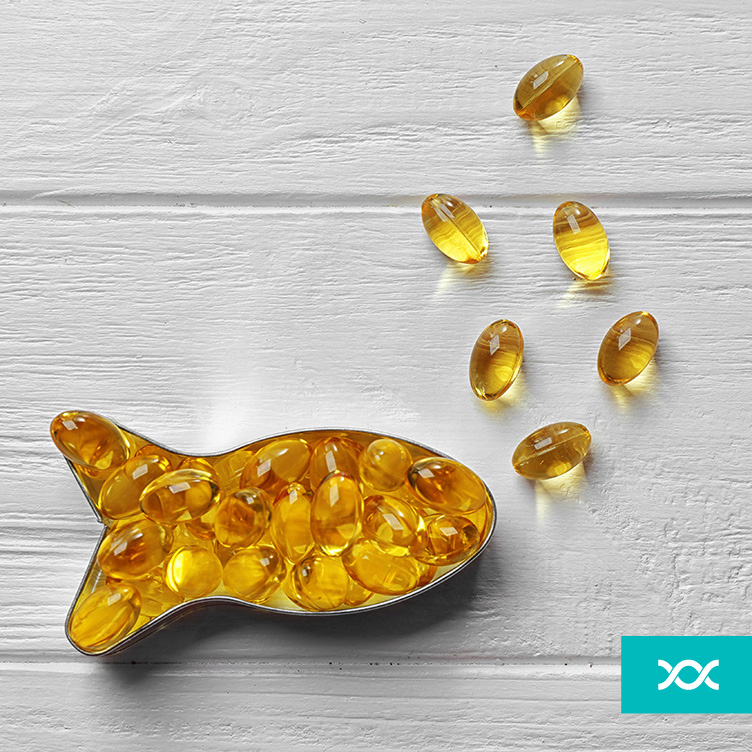Discover which are key vitamins for dry skin, what effect they have and what to add to your diet to increase their intake.
Dry skin can be caused by various factors – dehydration, cold temperatures, skin conditions, ageing and more. While we’ve already written about how to prevent winter rash and ashy skin and how to take care of dry skin, we haven’t yet touched a very important factor – vitamins.
Some vitamins are essential for your skin’s well-being and healthy look. We’re going to focus on 4 main ones, discuss what’s their role, how they help your skin, how your genes impact them, and where can you find these vitamins.
As you’ll see in the article, some of these vitamins impact or are found in the epidermis. The epidermis is the outermost and the most exposed layer of skin.
Alright, now let’s see which vitamins are best for your skin.
In this article


Vitamin D
It’s only right to start with vitamin D as it’s produced by our skin and protects our skin.
The outer layer of your skin is mostly made up of skin cells called keratinocytes. They are the only cells in your body that can form vitamin D when exposed to the sun by turning 7-dehydrocholesterol into a form your body can use. And it’s a good thing they can as vitamin D plays a key role in maintaining your skin’s immune system, which is the first line of defence against harmful pathogens. It decreases skin inflammation and also positively impacts skin cell growth.
Low blood levels of vitamin D are associated with skin conditions, including eczema and psoriasis — both of which are known causes of dry skin. Research has also indicated a correlation between vitamin D and skin moisture.
A study examining 83 women showed that those who had lower vitamin D3 levels also had lower average skin moisture. They observed these women as their blood levels of vitamin D3 increased and noted that their skin moisture increased as well.
A lot of people don’t get enough vitamin D, especially during the darker winter months. More and more people opt for vitamin D supplements, which can help prevent or treat dry skin. However, if you decide to take supplements, discuss them with your healthcare provider and look for products that were third-party tested to ensure their quality as there are plenty of cheap, low-quality vitamin pills on the market.
Vitamin D and genetics
In a study that began in 2010, vitamin D levels were measured for 33,000 people and several genes were analysed for their influence on vitamin D uptake. The study identified three genes, that varied slightly between people and influenced vitamin D levels.
The mutation in the GC gene had the greatest influence, and people with two unfavourable copies of the gene had 20 per cent lower vitamin D levels. The DHCR7 and CYP2R1 genes were also analysed in addition to GC, and they had an equally important influence on the vitamin D levels. The three genes play a big part in determining your natural vitamin D levels.
Sources of vitamin D
Vitamin D is a fat-soluble vitamin. This means it’s most abundant in high-fat foods and it’s better absorbed into your bloodstream when you eat it with fat.
While you can produce it yourself by exposing your skin to the sunlight, you can also get plenty of it by eating:
- fatty fish,
- fish oil,
- egg yolk,
- liver,
- some dairy products like yoghurt and cottage cheese – check the label if they’ve got added vitamin D.
Vitamin C
The skin contains very high levels of vitamin C; research found up to 64 mg of vitamin C per 100 grams of the epidermal skin layer. Vitamin C can help your skin in more ways than one.
It stimulates the production of collagen, which is the main protein found in the skin and is important for its firmness.
It’s a powerful antioxidant, it helps to neutralise free radicals and lessens the appearance of hyperpigmentation by restoring UV damage. It also triggers a skin healing response and stimulates cell repair.
Vitamin C supports water retention in the outer layers of your skin by preventing transepidermal water loss which happens when your skin’s protective barrier has been damaged. It’s especially potent paired with hyaluronic acid.
Vitamin C and genetics
Dietary vitamin C is transported in the human body by two transporter proteins, one of which is encoded by the SLC23A1 gene. A variant of this gene causes reduced absorption of vitamin C and is associated with lower levels of plasma vitamin C. The SLC23A1 gene was identified to be associated with circulating concentrations of L-ascorbic acid in the general population, which indicates that people with the mutation present should increase their intake of vitamin C.
Sources of vitamin C
What should you eat if you want to enhance your diet with more vitamin C?
- Citrus fruits (oranges, grapefruits, lemons),
- blackcurrant,
- red bell pepper,
- kale,
- broccoli,
- tomatoes,
- acerola cherries – a single cherry usually has enough vitamin C to satisfy daily requirements.
Vitamin E
Vitamin E can calm and soothe many inflammatory skin conditions such as extreme dryness, psoriasis, and eczema. It fortifies your skin’s layers and plays a vital role in cell function.
Similar to vitamin C, vitamin E is also an antioxidant that neutralises skin-drying free radicals and has an anti-inflammatory response to UV exposure and sun damage.
Vitamin E can also be used topically and a lot of moisturisers and skin cream contain it. It helps seal up the cracks caused by skin dryness and it helps with skin restoration by preventing water loss and keeping it moisturised. Vitamin E works well together with vitamin C so you’ll often find products containing both.
Vitamin E’s moisturizing and scar-diminishing properties also make it a popular ingredient in scar and stretch mark treatments.
Vitamin E and genetics
Scientists have discovered that the reason behind the differences in vitamin E levels among people is not only the food they eat. Scientific research has proven that a favourable mutation can occur in the APOA5 gene increasing vitamin E levels. People with such a genetic makeup have already higher vitamin E levels to start with, and as a result, they need a lower daily intake for an optimal state. People with a common variant of the APOA5 gene have to include foods with more vitamin E into their diet to ensure optimal levels.
Sources of vitamin E
You can increase your vitamin E levels by upping the intake of:
- wheat germ or wheat sprouts,
- olive and sunflower oil,
- almonds, pine nuts, peanuts, hazelnuts,
- broad beans.
Some of the vitamin E is lost with baking, roasting, and sautéing, so your source of vitamin E should be mainly fresh vegetables, nuts, seeds, and quality oils. Vitamin E is also sensitive to light, so you should store your vitamin E-rich food in the dark.
Vitamin B
B group vitamins are multipurpose vitamins and therefore it’s no wonder that they play a role in your skin’s health.
Vitamin B1(also known as thiamine) is an antioxidant and increases circulation. Vitamin B2 (also known as riboflavin) deficiency can cause dry skin and lips. Vitamin B9 (also known as folic acid) helps the body make DNA and RNA and helps to develop healthy skin cells. It is also an antioxidant that works to reduce oxidative stress in the skin and can reduce the occurrence of acne and pimples. Vitamin B12 (also known as cobalamin) produces proteins that help to repair dry skin and maintain hydration.
The most important vitamin B (also known as niacin) skin-wise is B3. It produces fats that help your skin remain healthy. As an antioxidant, it protects your skin against sun exposure and related skin damage. When applied topically, B3 remains in the epidermis. It acts as a regulator, sealing in moisture and battling transepidermal water loss.
It’s also important to know that vitamin B deficiency can cause some really undesirable skin problems.
Vitamin B and genetics
MTHFR is one of the most important enzymes, which ensure appropriate B9 vitamin levels. A mutation within this gene influences the enzyme, and many studies confirmed that this can affect vitamin B9 levels. MTHFR enzyme is less active in people who are carriers of an unfavourable variant of the gene, resulting in lower vitamin B9 levels. It has been discovered that every unfavourable copy of the MTHFR gene markedly reduces vitamin B9 levels. If you are the carrier of one of the unfavourable copies of the gene, it is highly recommended that you adjust your diet to achieve optimal health.
Numerous studies have confirmed the influence of the FUT2 gene and its genetic variant on vitamin B12 levels. The research that we rely on has proven that every unfavourable copy of the FUT2 gene reduces vitamin B12 levels by 10 per cent. As a consequence, people with the least favourable genetic makeup have a 20 per cent lower vitamin B12 levels.
Sources of vitamin B
Foods that are generally high in several vitamins B are:
- salmon and tuna,
- leafy greens (spinach, collard greens, romaine lettuce),
- liver,
- pork and beef,
- legumes,
- oysters, clams, and shells,
- eggs,
- milk and dairy products.
Zinc and essential fatty acids
While they are not vitamins, zinc and essential fatty acids are two micronutrients we simply have to mention while talking about dry skin.
Zinc
Zinc plays a crucial role in skin health. Your body needs it for protein synthesis and wound healing. It is also a vital antioxidant, transports vitamin A from the liver, and helps in the metabolism of omega-3s. It has anti-inflammatory benefits and can prevent skin dryness and redness. Plus, it supports the immune system–aiding enzymes that could help prevent skin conditions such as eczema that can cause dry skin. Even mild deficiencies in zinc can impair collagen production, fatty acid metabolism, and wound healing.
Scientific research shows that genetics can influence a person’s zinc blood levels. CA1, PPCDC, and NBDY genes have all been shown to be significantly associated with a person’s blood levels of zinc.
Fatty acids
Fatty acids help with skin hydration and bolster the skin’s fatty acid barrier, adding extra protection against elements and locking in moisture. Omega-3s deficiency may show through dry and itchy skin.
Fortunately, there is a single supplement that’s packed with fatty acids – fish oil. It contains omega-3s, docosahexaenoic acid (DHA) and eicosapentaenoic acid (EPA) which also help to reduce skin inflammation.
What’s your optimal vitamin intake?
Now you know which 4 vitamins are key for healthy and hydrated skin and what to add to your diet to increase the daily consumption of them.
Do you want to know more about your body’s vitamin needs? Unlock your full genome to discover your optimal nutrition, sports, stress management, sleep, and health care with our Premium DNA test.



















